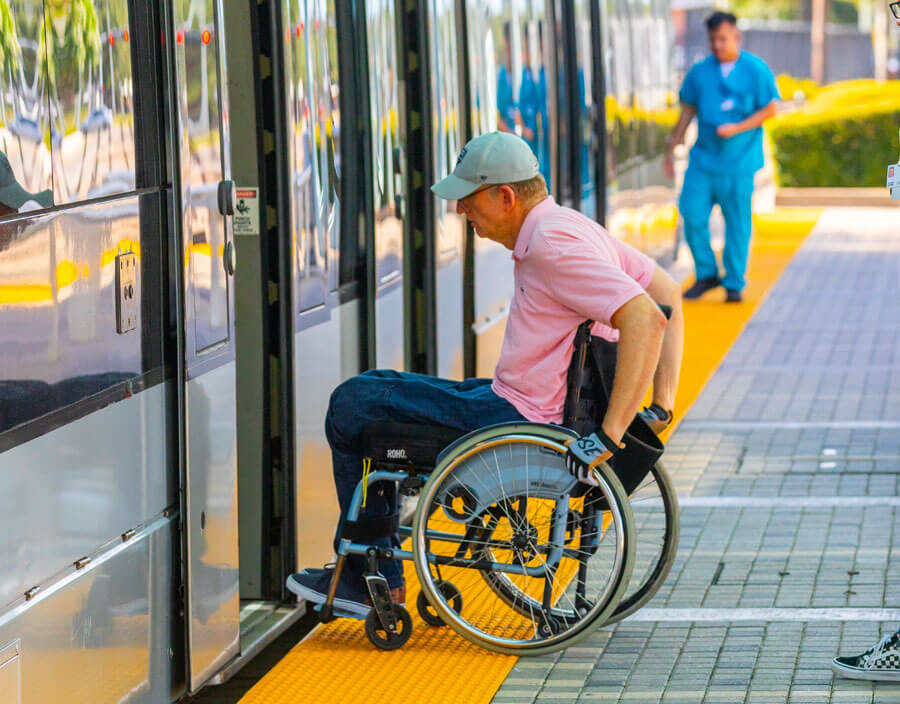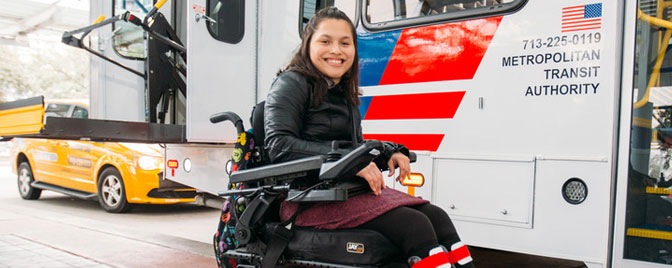To ensure equal and safe access to all riders, this policy outlines the procedure for receiving, processing, and responding to requests for reasonable modifications to METRO's policies or practices by persons with disabilities.
The Metropolitan Transit Authority of Harris County, Texas ("METRO") is committed to providing safe, reliable, accessible and user-friendly services to our customers, including those with disabilities. To ensure equal and safe access to all riders, this
policy outlines the procedure for receiving, processing, and responding to requests for reasonable modifications to METRO's policies or practices by persons with disabilities.
Legislation
On March 13, 2015, the Department of Transportation issued a Final Ruling regarding 49 CFR Parts 27 and 37 Transportation for Individuals with Disabilities; Reasonable Modification of Policies and Practices. This ruling requires public entities providing
designated public transportation services to make reasonable modifications/accommodations to policies and practices to ensure program accessibility. The rule further requires that public entities adopt a formal process for tracking and responding
to said requests for modifications.
Goal
Effective July 13, 2015, METRO shall review and revise, the procedure to track all requests for reasonable modification to operational policies and practices to ensure services are accessible to persons with disabilities. As part of this implementation,
METRO will:
- Ensure all front-line operators are properly trained to recognize a request for reasonable modifications/accommodations related to a person's disability, and to properly document said request.
- Review and revise the method of communication that allows front-line operators a means to communicate said request with dispatch personnel to ensure federal guidelines are met.
- Review and revise training for all personnel who have contact with the public (Call Center staff, dispatch, road supervisors, etc.) to ensure they are properly trained on this policy.
- Review and revise a tracking mechanism, within METRO's complaint database, for complaints related to requests for reasonable accommodations to ensure that passengers have an opportunity to escalate their requests.
- Ensure that responses to requests and/or complaints are promptly completed and that if a request is not granted, that all steps to the extent possible are taken to ensure services are accessible.
- Designate a single responsible employee as required under the Final Rule, to coordinate all efforts related to these requirements.
- Ensure that all forms of communication with the public including website and print media contain information regarding this reasonable accommodation policy, how requests for accommodation can be made, and in a format that is accessible to an individual
with a disability.
Procedure
- Individuals requesting modifications shall describe what they need in order to use the service.
- Individuals requesting modifications are not required to use the term "reasonable modification" when making a request.
- Whenever feasible, requests for modifications shall be made and determined in advance, before METRO is expected to provide the modified service, for example, during the paratransit eligibility process, through customer service inquiries, or through
the METRO's complaint process.
- Where a request for modification cannot practicably be made and determined in advance, operating personnel shall make a determination of whether the modification should be provided at the time of the request. Operating personnel may consult with METRO's
management before making a determination to grant or deny the request.
- Requests for modification of METRO's policies and practices may be denied only on one or more of the following grounds:
- Granting the request would fundamentally alter the nature of the METRO's services, programs, or activities;
- Granting the request would create a direct threat to the health or safety of others;
- Without the requested modification, the individual with a disability is able to fully use METRO's services, programs, or activities for their intended purpose.
Contact
Please call the following numbers to make a request for reasonable accommodation before using the service, if at all practicable:
For requests related to bus or rail services please contact Customer Care at 713-635-4000.
For requests related to METROLift please call 713-225-0119 or 713-652-8969 (TTY).











 Google Chrome
Google Chrome
 Safari Mac OS
Safari Mac OS
 Mozilla
Mozilla
 Microsoft Edge
Microsoft Edge